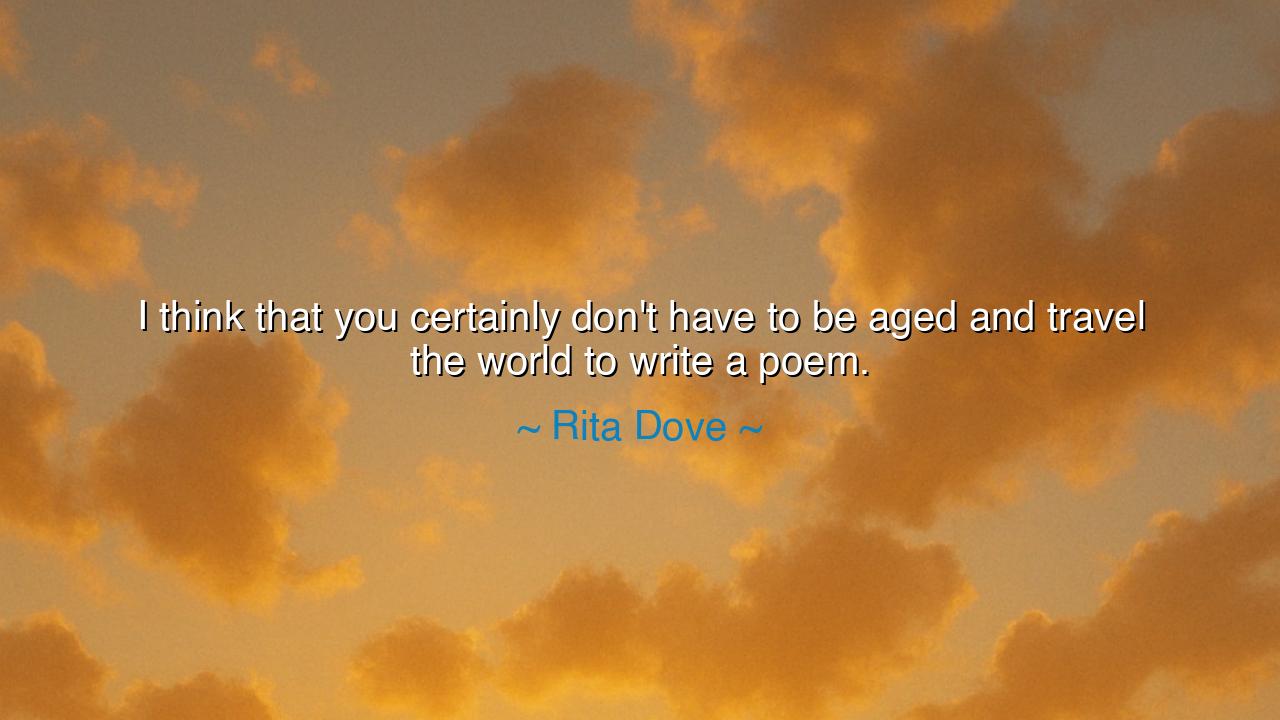
I think that you certainly don't have to be aged and travel the






Rita Dove once spoke with a clarity born of the poet’s heart: “I think that you certainly don’t have to be aged and travel the world to write a poem.” In these words lies a profound unveiling of the nature of art. For she tells us that poetry does not demand years of wandering, nor the weary map of life etched upon the face. A poem can arise not from vast journeys across oceans and deserts, but from the stillness of a single room, from the immediacy of a single moment. What matters is not how far the feet have traveled, but how deeply the soul has listened.
The ancients knew this truth well. Sappho of Lesbos, though she did not command armies nor voyage across continents, poured forth poems that still burn like fire today. Her island was her universe, her own heart her ocean, and from this intimacy sprang lines that captured eternity. She did not wait for age, nor for journeys to distant kingdoms—her poetry was born from the sharpness of feeling, from the raw pulse of life. Thus, Rita Dove stands with Sappho in proclaiming: the wellspring of poetry is not geography nor age, but the depth of perception.
Her words also break the chains of expectation. Too often, we are told that greatness must come after long suffering or from worldly experience. But Dove reminds us that even the young, even the untraveled, may sing the truths of existence. Youth has its own vision, as piercing as the gaze of the elder, and just as worthy of shaping into verse. The child who watches rain against a windowpane may speak with as much honesty as the sage who has circled the globe. For the essence of poetry is not accumulation, but attention.
Consider the life of Arthur Rimbaud, who wrote some of the most startling poetry of the nineteenth century before he turned twenty. Though he later traveled, his greatest verses were born when he was still bound to the narrow streets of his youth. His poems remind us that the fire of creation often comes in the freshness of vision, before the dust of routine settles upon the soul. In this, his life is a living proof of Dove’s claim: poetry need not wait for age, nor for distant lands, but bursts forth whenever the heart dares to see clearly.
At the same time, Dove’s statement contains a gentle liberation for those who doubt themselves. How many silence their voices, believing they have not yet earned the right to create? How many wait for travel, for maturity, for some imagined permission from the future? Her words strike against this hesitation. They call upon all who feel even the smallest stir of inspiration to seize it now, without excuse, without delay. For poetry is not reserved for the experienced—it is the inheritance of all who breathe.
The lesson for us is radiant: poetry is presence. To write a poem is not to record the grandeur of the world’s expanse, but to capture the eternal in the fleeting. The first laugh of a child, the weight of silence after loss, the shimmer of light upon a common stone—these are as worthy of poetry as the monuments of Rome or the temples of Kyoto. Do not wait until you have circled the earth; look instead at what lies before you now, and you will find infinity reflected there.
Practically, this means nurturing the practice of noticing. Carry a small book, or hold space in your heart, to capture the sparks that appear in daily life. Let no moment be dismissed as too small, for within the smallest detail may live a universe. Trust that your voice, whether young or untraveled, has the right to speak. Write now, and in writing, you will discover that the poem does not need to wait for age or journey—it only waits for your attention.
Thus, Rita Dove’s words endure as a teaching for all generations: you do not need to be aged or to wander far to write a poem. The poem already lives within you, waiting only for the courage to be released. Walk not across continents, but across the landscapes of your own heart, and you will find that your voice is already vast enough to hold the world.






AAdministratorAdministrator
Welcome, honored guests. Please leave a comment, we will respond soon